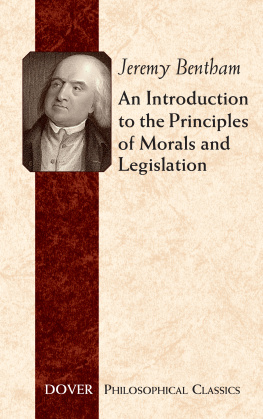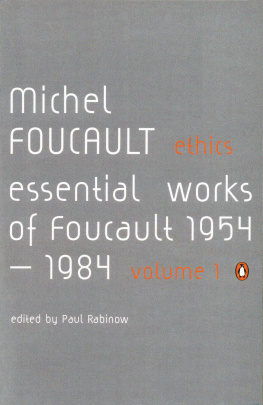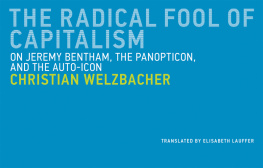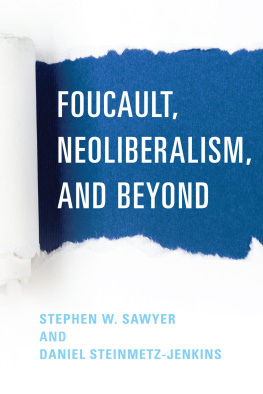ACKNOWLEDGEMENTS
Research resulting in the chapters for this book emanate from the Thorie politique et thorie de lEtat chez Jeremy Bentham project, funded by a French National Research Agency (ANR) grant for proposals on Corpus et Outils de la Recherche (200811). The project is hosted by the Centre Bentham, the French research team of Bentham scholars, formerly based at Paris Ouest-Nanterre-La Dfense University. I am very grateful to the French University Council, which granted me six months leave to finish my book, and to my University, which generously agreed to finance it.
This work is indebted to a wide range of people. My thanks go to Prof. Franck Lessay (Sorbonne-Nouvelle), Prof. Suzy Halimi (Sorbonne-Nouvelle), Prof. Stephen Engelmann (University of Illinois), and Dr Michael Quinn (University College London) who have supported this project. Dr Rosalind Greenstein (Panthon-Sorbonne University), Catherine Pease-Watkin (UCL), Dr Crawford Gribben (Trinity College, Dublin), and Prof. Jennifer Merchant (Panthon-Assas University) have provided helpful comments on the manuscripts. I would like to add a special thanks to Solne Smichon (Panthon-Assas University) who has provided assistance in this, as in many other, projects. Thanks are also due to the invaluable comments of the anonymous readers.
This book has benefited from the support of the members of the Centre Bentham (ScPo, Paris), the Bentham Project (UCL), and the Centre Perelman (ULB, Brussels). They have provided ideas, resources and comments on the manuscript. To their friendship, encouragement and criticism I owe an inestimable debt.
Finally I owe more gratitude than I can express to Olivier who is a loving and caring husband, and to Elvire and Louis who are sweet but at times maddening distractions. It is to them that this book is dedicated.
Anne Brunon-Ernst
January 2012
EPILOGUE: (DE)CONSTRUCTING BIOPOLITICS
Words without ideas, phantoms without substance, have hitherto composed, and for a long time will continue to compose, the discourse of the bulk of arguing on politics and morals.
First is the wish to neutralize, and as it were polish, scientific language to the point at which, stripped of all its singularity, purified of all its accidents and alien elements ... it could become the exact reflection, the perfect double, the unmisted mirror of a non-verbal knowledge. This is the positivist dream of a language keeping strictly to the level of what is known: a table-language.
From Norm to Language
Norms run through the argument of this volume. The utility principle is normative, as are Foucaults pleasures and pains, notwithstanding his refusal to norm them. What Bentham teaches us about Foucaults pleasures is that they cannot operate if they do not abide by a minimal norm, which is utilitarian in essence. Conversely, what Foucault teaches us about Benthams pain is that utility cannot be construed as a monolithic norm. Instinct appears as the underside of motives for acts which do not comply with utility. Part I has shown how norms in Bentham and Foucault are not a scheme for assessing compliance or noncompliance to the norm; the opposition is not binary. Norms in Bentham and Foucault operate in a continuum between minimum compliance to the norm and maximum compliance. In utilitarian and biopolitical contexts, the norm is the utilitarian calculus of a cost/benefit assessment.
Part II has explored the meaning of norms in Bentham and Foucault. There are two different levels of norms: norms per se and meta-norms, the first being framed by the second. It also unearthed two types of meta-norms: the metanorm of content and the meta-norm of form. The meta-norm of content is utility, which is assessed on a continuum of compliance as explained above. It defines the content of the normative statement. The meta-norm of form makes it possible for any normative statement to be obeyed. It ensures compliance, through the disposition to obey, which is common to Bentham and Foucault.
Legal norms, with their very intricate double meta-functioning, are not the type of normative statement Foucault privileges when he deals with biopolitics. Indeed he is adamant that the specificity of the era of biopolitics lies in the fact that mechanisms of control are not legal, but extra-legal. This leads to the study of extra-legal norms. In Foucaults works, biopolitical norms aim to lead individuals by non-legal means, be it in private or public life. In Bentham, there is a clear distinction between acts pertaining to public life and those pertaining to private life. The first is related to indirect legislation and the second to ethics. One should not be misled by conflicting terminology. What Foucault takes out of the realm of law, Bentham includes within a specific type of legal operation which he calls indirect legislation. It is certainly the case that both are performing the same analysis of the conduct of conduct, but under different names. The aim of Benthams indirect legislation is to make individuals carry out voluntarily acts that are expected of them. He achieves this aim through the influence on understanding (voluntary acts) and will (rewards). Here Benthams theorization of the conduct of conduct goes beyond the concept of power, which is operational in Foucault, and unites transparency and publicity, in Habermass sense, to contribute to the formation of the general will through the reciprocal influence of the governed and the governors.
Part III has explored the concept of expertise. It focuses on individuals who have authority to impose norms on other individuals. Two figures have been studied: the moralist (Benthams deontologist and Foucaults parrhesisates) and the economist. In areas of private conduct, ethics reigns freed from the chains of legislation, but not that of norms, since ethical value statements are normative. It is in this particular area that the influence of Bentham on Foucault seems to be less significant. However, it is of interest that both philosophers view themselves as self-appointed experts of ethical norms. Moreover, there is no rationale in their works to explain why certain individuals, rather than others, would be entitled to set ethical norms.
Let us now turn to the field of economics. For Benthams economists the rationale of their action lies in a good understanding of the norms of utility, whereas for Foucault the truth of the economists advice lies in the market. Indeed, the heritage of Benthams thought in Foucaults work is to be seen in the well-known instance of panopticism and in The Birth of Biopolitics. However, I contend that if Bentham and Foucault speak of one mind when it comes to considering economic discourses, acts and previsions as another form of conduct of conduct, they differ when it comes to the content of the economic norm. In his description of utilitarian economics, Foucault situates the norm in the calculus of the market, whereas Bentham situates it in the calculus of utility. Although both loci function by abiding by the rules of a mathematical calculus, they differ in that the utilitarian calculus, with its specific cost/benefit analysis in terms of pleasures and pains for individuals and the community, entails that either the market might be left free to satisfy supply and demand or that it might be curbed by the imposition of a maximum legal retail price. Both are possible, without any contradictions, on account that utility, and not the market, is the norm of the economist. Here again, the argument identifies economic norms as indirect legislation.
Legrand defines norms as rules negotiated among individuals, before being internalized and re-coded by them. Eulogistic or dyslogistic opinions about acts expressed in words are conveyed through language by public opinion. This public opinion thus sets norms of acceptable or unacceptable behaviour. Bentham explains:





